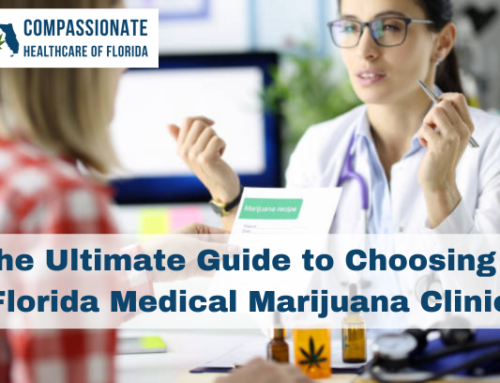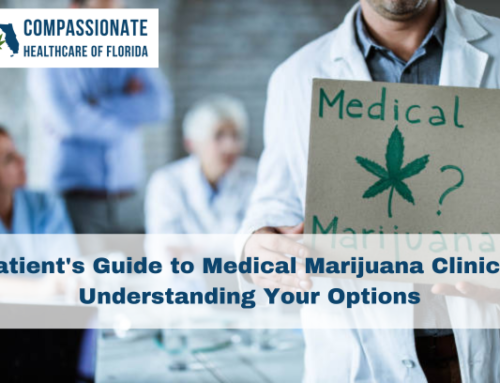
Medical marijuana is legal in Florida for qualifying individuals. If you’re thinking about getting your medicinal cannabis card in the sunshine state, it’s essential to understand the laws. The state legislature passed the treatment option in 2014 but has transformed rapidly over the past six years.
How Does Florida Define Medical Cannabis?
In 2014, the state passed its first medical cannabis law allowing authorized marijuana doctors to qualify patients for a marijuana card starting on January 1, 2015. The legislation defines medical cannabis as,
“the acquisition, possession, use, delivery, transfer, or administration of marijuana authorized by a physician certification.”
The “Right to Try Act” provides state approval and legal protection for qualified patients.
In 2016, voters in the state voted to update the law and expand the qualifying conditions list. Before this change, marijuana doctors could only write recommendations for patients with terminal illnesses and less than a year to live. The law also required two physicians to confirm the diagnosis before approving the compassionate use.
In March 2019, SB 182 was passed into law and greatly expanded the flexibility of medical cannabis usage in Florida. Physicians were now given the ability to recommend smoking as a route of administration for patients.
What is Low-THC Cannabis?
All non-terminal patients in Florida with a qualifying condition are subject to low-THC cannabis. This part of the law limits it to 8% or less THC. Products also must contain 10% or more CBD, providing a well-balanced ratio of CBD: THC. Medical marijuana in Florida has now matured to the point that patients can almost always find a product that works well for them with countless THC ratios and consumption methods available.
Do You Have a Qualifying Condition for Medical Marijuana in Florida?
In 2014, the answer would have been no for most patients. The 2016 update greatly expanded the qualifying conditions.
Under Amendment 2, patients can qualify with the following conditions for a medical marijuana card in Florida:
- ALS
- Cancer
- Crohn’s Disease
- Epilepsy
- Glaucoma
- HIV/AIDS
- Multiple sclerosis
- Parkinson’s disease
- PTSD
It also allowed leeway to marijuana doctors in Florida to make medical decisions based on their knowledge of the plant’s natural healing abilities. The wording for Senate Bill 8A states that physicians can allow medical marijuana treatment for other debilitating conditions and are similar to the list of qualifying conditions.
Examples include:
- Chronic pain
- Anxiety
- Depression
- Chronic nausea
- Diabetes
- Insomnia
- Migraines
- Restless Leg Syndrome
- Muscular dystrophy
This list is by no means a full list. If you’re unsure, you should still speak with a licensed marijuana doctor in Florida.
You will also need to provide some additional information to the state medical cannabis department to qualify in-state. Along with your primary health and condition, applicants need to provide proof of address by a Florida driver’s license or ID card.
Additionally, seasonal residents will need to offer proof that they reside in the state for more than 30 days to qualify as part-time residents. This can include documents such as:
- Rental agreement or lease
- Deed or mortgage statement
- Utility bill less than two months old
- State, federal, or local government mail
- Mail from a financial institution with a Florida address
You will need to pay the marijuana doctor’s fee for your examination and recommendation, which varies by medical practice. Also, the state charges a $75 fee per patient to issue the marijuana card. Once you submit the paperwork and payment, it takes about 10 to 15 days to issue.
Is it Hard to Get Your Legal Marijuana card in Florida?
In 2014, our answer would have been yes because the conditions allowed were severely limited. However, Amendment two changed the laws to benefit patients. Now individuals of all ages with a qualifying condition can access medical marijuana legally throughout the state.
How Often Do Patients Need to Renew Their Marijuana card?
Your medical marijuana card in Florida is good for 12 months. Patients need to renew one time per year and pay the $75 charge. You will need to have another recommendation issued by a qualified doctor every seven months and supply the same information as you did for your original application. To avoid gaps in your coverage, the agency suggests individuals complete all applicable paperwork 45 days before their current card’s expiration date.
Can Patients Skip In-Person Medical Marijuana Examinations?
Florida temporarily changed the rules for video conferencing and medical cannabis exams because of complications from the novel 2020 COVID-19 pandemic; however this is no longer in effect. The update allowed current patients established with the certifying physician to safely access order renewals of medical marijuana during COVID-19, but this change via an executive order by Governor Ron DeSantis expired and is no longer allowable.
Who Has Access to my Medical Marijuana Doctor’s Records in Florida?
Your medical marijuana records aren’t public record. But they are accessible by law enforcement officials. This access allows police officers to verify your legal right to use and carry cannabis. It protects you from facing unnecessary jail time and police harassment. The law officers can only view your records as part of a criminal investigation. They don’t have access to your full medical records or details of what products you’ve purchased for treatment.
Title XXIX, Chapter 381 of Florida Statutes explains,
“The department shall allow access to the confidential and exempt information in the medical marijuana use registry to:
(a) A law enforcement agency that is investigating a violation of law regarding marijuana in which the subject of the investigation claims an exception established under s. 381.986, except for information related to the patient’s diagnosis.”
What are the Medical Marijuana and Driving Laws in Florida?
The medical cannabis laws in Florida for driving are similar to driving under the influence of alcohol. Possessing a marijuana card in the state doesn’t allow patients to operate any motor vehicle under the mind-altering medication’s effect. Patients with a valid medical card will still face DUI charges if they’re pulled over and determined to be impaired by a law officer.
Patients can transport cannabis legally in their vehicles. However, it must stay in the original packaging. These laws only apply within the state. It is illegal to cross state lines with marijuana. This includes traveling to or from other locations that permit medical or recreational cannabis use.
If you’re pulled over for a traffic violation and the police officer has reasonable suspicion, they can search your car. To avoid unnecessary problems, always carry your marijuana card and follow the limits and rules strictly.
Can You Board a Plane with Medical marijuana in Florida?
Flying with legally purchased cannabis is a tricky question because the Federal government regulates most airports, and medical cannabis is a state law. It’s best to follow the TSA guidelines for legal state marijuana and skip airplane travel with the potent plant until federal laws change. The agents won’t specifically search your belongings for marijuana. But if you’re caught in an airport, on federal land, or crossing state borders, you could face serious legal consequences.
On the other hand, it is okay to travel with CBD on planes, provided it contains less than 0.3% THC. Hemp-based products with less than 0.3% THC are federally legal following the 2018 Farm Bill passage.
Can Employers Fire Employees that use Medical marijuana in Florida?
Medical marijuana and the workplace is a complex subject. As with all conditions and treatments, patients aren’t required to advise employers of their health issues or about their legal marijuana use to treat them. But the law doesn’t protect employees from employer drug testing or stop employers from firing employees for legal marijuana use.
Additionally, because cannabis is illegal federally, it doesn’t fall under the Americans with Disability Act for protection. More so, patients that work in places that receive federal funding may also be exempt from any state protections.
“APPLICABILITY.—This section does not limit the ability of an employer to establish, continue, or enforce a drug-free workplace program or policy. This section does not require an employer to accommodate the medical use of marijuana in any workplace or any employee working while under the influence of marijuana. This section does not create a cause of action against an employer for wrongful discharge or discrimination. 1684 Marijuana, as defined in this section, is not reimbursable under chapter 440.”
Where can you use Medical Marijuana in Florida?
The only legal location to use medical marijuana in Florida is your home or personal watercraft on state bodies of water. Some products (such as edibles, oils, and capsules) are safe to use in public places, including public transportation. The following locations are illegal and should be avoided:
- Employment locations (No on-the-job use unless permitted by the employer)
- In a motor vehicle
- In an aircraft
- At state correctional facilities
- On school grounds
- On a school bus
It’s essential to know the differences between state and federal land when using cannabis outside your residence. Any use on federal property is subject to drug charges with serious repercussions. Additionally, there are no protections from eviction for legal cannabis use. Laws that protect individuals’ rights are federal. The federal regulations don’t protect marijuana because it’s not a legal substance.
Can Out-of-State Medical Marijuana Patients Buy and Use Products in Florida?
Yes. Florida is known for its seasonal population. The part-time residents are affectionately known as ‘snowbirds’ in the sunshine state. If you’re going to be here at least 31 consecutive days, you can qualify for a cannabis license. Patients must spend at least one 31 consecutive day period in the state each year. They are eligible even if they’re registered to vote or pay taxes in another jurisdiction.
Can Florida Patients Use their Marijuana card in the Other Legal States?
Receptacle laws vary by state. Individuals would need to check with the location they’re traveling to for more information. Patients still can’t drive or cross state lines with marijuana. The plant is illegal federally, and you could face serious consequences, even if you’re transporting legal cannabis.
If you’re traveling away from Florida, you can purchase products in several states with recreational sales or which allow out-of-state purchases.
- Alaska
- California
- Colorado
- Illinois
- Maine
- Massachusetts
- Michigan
- Nevada
- Oregon
- Vermont
- Washington
- Washington, DC *
The asterisk next to Washington, DC, comes from the unique cannabis situation the district creates with its recreational program. There are no legal dispensaries for adult-use only marijuana. Instead, DC has a gifting setup. The system allows people 21 and older to purchase items, such as t-shirts and artwork, receive free flowers and edibles, and concentrate as a complimentary gift.
Also, when you get your cannabis gifts in DC, watch out for federal land. The national parks and other areas are great to visit. Still, if you’re caught there with medical marijuana, you’ll face federal drug charges.
In addition to recreational sales, several states allow out-of-state medical patients to buy products with their marijuana cards. These include,
- Alaska
- Arizona
- Arkansas
- California
- Colorado
- Hawaii
- Illinois
- Maine
- Maryland
- Michigan
- Nevada
- New Hampshire
- Oklahoma
- Oregon
- Rhode Island
- Washington, DC
Don’t try to return to Florida with recreational or medical marijuana from another state. Although it’s legal to purchase in these states, it’s illegal to cross the border with it. Additionally, if it contains more than 8% THC and less than 10% CBD, it’s not legal to use in Florida.
Violating your right to access legal cannabis in Florida could jeopardize your freedom and your marijuana card. Using this method, you’re following the laws in both states and not traveling across state borders with a federally illegal substance.
Does Medical marijuana laws in Florida Bar Patients from holding a Concealed Weapon Permit?
The two systems aren’t connected, which means when you apply for either, the qualifying agency won’t be able to use data from the other to approve or deny your application. Legally, you shouldn’t have a problem purchasing a gun and securing a medical marijuana card at the same time.
Nicole Fried, Florida’s Commissioner of Agriculture and Consumer Services who oversees issuing concealed weapons permits, has mentioned on more than one occasion that
“I have both [a concealed weapons permit and medical marijuana card]. So I want to make that very clear, that I will not be taking anybody’s concealed weapons permit or not renewing them. I see no conflict between the two.”
However, federal laws apply to some gun purchases. Long story short, patients could experience difficulties purchasing weapons that require an ATF weapons permit if they regularly use cannabis, even if it’s legal in the state.
Where Can Medical Marijuana Patients Purchase THC Products?
Patients can only buy cannabis from a legal and licensed dispensary. Florida law refers to these as Medical Marijuana Treatment Center. We have a full list of MMTC locations and promotions offered here. Many of these locations offer cannabis delivery for patients with a qualifying recommendation. Additional fees may be charged for home delivery services, and restrictions may apply, such as a minimum purchase amount.
What Types of Medical Marijuana Products are Legal in Florida?
All methods of delivery for cannabis are legal in Florida if they meet the low-THC requirement. Medical consumers can purchase:
- Flower
- Concentrates (Oils, vapes, wax, dabs, and shatter)
- Topicals
- Capsules
- Edibles
Flower was a point of contention in the law. In 2016, then-Governor Rick Scott prevented the potent buds and sales for smokable products in the state. In 2018, Governor Ron DeSantis removed the restriction.
Edibles are the newest addition to the list. These were approved on August 27, 2020. To access these legally, patients must have an updated medical marijuana recommendation from their marijuana doctor supporting the use of edible products.
Is there a limit to how much cannabis a medical patient can have on them or purchase at a time? Yes. The state law allows patients to possess a 70-day supply or four ounces of flower at any given time. Individuals must keep the items in their original packages for verification. Patients can still only buy a 35-day supply of flower at a time, or no more than 2.5 ounces.
Patients may not grow their own medicine in the Sunshine state legally.
Do the State Regulators Require Safety Screenings for Products in Florida?
Yes. The Department of Medical Marijuana Use requires companies to send samples to a licensed testing facility to check for cannabinoid count, residual solvents, pesticides, heavy metals, microbes, moisture, and other contaminations. These screenings will also verify the THC levels are below 8%, and CBD is 10% or higher to provide consumers with a well-balanced product.
How Can Compassionate Healthcare of Florida Help Me?
Compassionate Healthcare of Florida is dedicated to helping residents receive all-natural treatment options through medical marijuana in Florida. Using empathy, kindness, and scientific knowledge, we guide patients to nature-based medical solutions.
We provide eligible Florida residents a medical marijuana recommendation to the Department of Health Office of Medical Marijuana Use (OMMU). The legal marijuana card allows them legal access to the state’s authorized dispensaries. The recommendation is good for seven months, at which time patients return for recertification.
These are the current medical marijuana laws in Florida as of November 1, 2021. These laws have been evolving for over the years to meet the needs of Florida residents better. Stay up-to-date on changes that can affect you and your loved ones by following the updates on the Compassionate Healthcare website.



